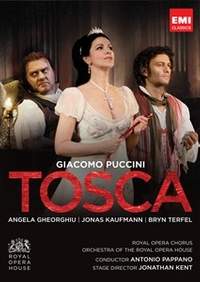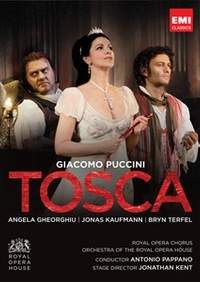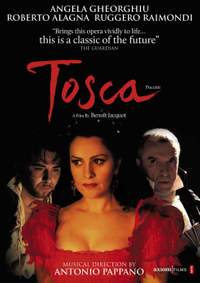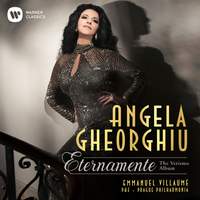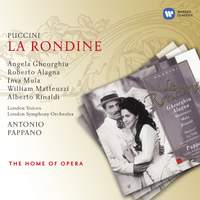Interview,
Angela Gheorghiu on Tosca and Eternamente
 The Romanian soprano Angela Gheorghiu's meteoric rise to fame in the early 1990s was kick-started by an incredible Violetta in La traviata at Covent Garden which famously reduced Sir Georg Solti to tears, but for the past decade or so it’s been Puccini’s Tosca which has dominated her career on stage: her portrayals of the tempestuous diva have been praised for the ‘dramatic insight and tonal nuance’ (The Stage), ‘transparency of timbre’ (Opera News) and ‘strength of characterisation’ (Opera Today) which she brings to the role. I met up with her at the Royal Opera House, where she opens in the revival of Jonathan Kent's 2006 production tomorrow evening, to discuss her long history with this opera and this theatre, her recent album of verismo arias, and forthcoming new repertoire...
The Romanian soprano Angela Gheorghiu's meteoric rise to fame in the early 1990s was kick-started by an incredible Violetta in La traviata at Covent Garden which famously reduced Sir Georg Solti to tears, but for the past decade or so it’s been Puccini’s Tosca which has dominated her career on stage: her portrayals of the tempestuous diva have been praised for the ‘dramatic insight and tonal nuance’ (The Stage), ‘transparency of timbre’ (Opera News) and ‘strength of characterisation’ (Opera Today) which she brings to the role. I met up with her at the Royal Opera House, where she opens in the revival of Jonathan Kent's 2006 production tomorrow evening, to discuss her long history with this opera and this theatre, her recent album of verismo arias, and forthcoming new repertoire...
The two roles which have dominated your repertoire for the past few years, Tosca and Adriana Lecouvreur, are both star performers – what parallels do you see between them, and are their special challenges involved in bringing characters who are themselves divas to life?
I never start with the subject-matter or the text when I’m preparing a role, because I’m not an actress - an actress can be focused on the libretto and the story, but I think more of the overall impact of the opera. But both Tosca and Adriana are based on plays by French writers, and also both roles were done on stage in Paris by Sarah Bernhardt. Puccini saw Tosca with her, and actually he didn’t like her - maybe because, as an actress playing an opera singer, she was too theatrical! When I play an opera-singer, in a way I am playing me – but at the end of the day I am not Floria Tosca, I am Angela! And it’s Angela who’s constantly striving to sing the right role, at the right theatre, at the right moment. Originally Adriana was meant to come before La rondine for me: in the 1990s, when I had just done the recording of La rondine, I was asked to sing Adriana at Covent Garden, and I said ‘No, it is best to have La rondine first’. And I was right, of course, because of the dramatic nature of the role: Adriana has a very powerful spoken passage (the monologue in Act Three), and also the character is more mature, whereas Magda in La rondine is just a girl.
Tosca has played a pivotal role in your career – do you feel a personal affinity with the role?
Oh yes, I have a lot of personal stories relating to Tosca! The first Tosca in my own life was another Romanian, Virginia Zeani, and I would listen to her thinking ‘Oh my god, what I would give to be so beautiful..!’. The singer who created the role was also a Romanian, Hariclea Darclée, and it’s thanks to her that we have 'Vissi d’arte': the composer had written two arias for the tenor but none for the leading role, and Darclée insisted, so Puccini wrote ‘Vissi d’arte’ for her, right there in the rehearsal! So it’s thanks to another Romanian soprano that I have the possibility to sing MY hymn – for my life, for my art, for my love.
Being Romanian is also relevant in another way. Puccini really related to the idea of revolution, and I lived in a period of revolution in Romania – when people have gone through that in their own country, they are a little bit different. Tosca is set on the day of the Napoleonic revolution: the characters are Italian, of course, but they too are made ‘a little bit different’ because of what’s going on around them. Puccini cut a lot from the Sarah Bernhardt play and concentrated on the last 24 hours of Tosca’s life, and by the end she, Mario Cavaradossi and Scarpia have all met very strong, brutal deaths. Now I grew up in a society with the type of police that we see in Scarpia, so I cannot blame this woman: if you’re about to be raped (because in a way it IS rape), with your lover being tortured close by, you would have to find a solution. I cannot say what I would do if I were put in that situation: I cannot even imagine killing a man with a knife, but I would scream, or maybe I would jump from the window. But Tosca must have the strength of character to kill, and you have to make that force believable, especially here with Bryn! He is my friend, my teddy-bear, and each night I would say to him ‘I am really sorry, but I need to kill you again!’.
With Tosca I also had the unique chance to make a movie: in fact I made the most important movie in opera ever produced, because it was really imagined for cinema, and I made them promote it all over the world. It came about thanks to a production of La traviata in Paris – the producer came to me afterwards and said ‘You are the Tosca I have been waiting for all my life!’. (And this is a man who is so crazy about Tosca that he named his daughter ‘Floria’!). We did the soundtrack with EMI – Roberto [Alagna] and I really fought to have Tony Pappano, who was just starting out at the time, and whom I worked with a lot for the next ten years. During filming I said to Covent Garden: ‘It’s time to have MY Tosca: let’s have a new production, for me’. I didn’t have a particular regisseur in mind, but they wanted someone English and so they hired Jonathan Kent. He has very good, clever ideas, and everything was done with my blessing – I will not be part of a crazy mise en scène, I cannot accept that, never. I felt a real responsibility to have the very best we could in such an important theatre, and the whole thing was a big achievement for myself and my career, the biggest since La traviata.
Your new recording centres on verismo roles – a lot of them heavier than you’ve sung in the opera-house to date. Do you feel your voice is becoming heavier or darker these days?
I hope not! I hate that! Because who says that a voice must change? It alters sometimes because you are not careful with it, or when your body changes physically: my body may become more mature, but I do everything I can not to notice the change in the voice. People who know and work with me know that Angela has never changed her technique. Certainly you can change your repertoire as you gain maturity and experience, and you can change your interpretation by adding more drama (of course I do that more in Tosca than in La traviata) - but my instrument itself never changes, and I am very glad for it! I will never change and I don’t want to change!
I cannot imagine the opera world without Luciano Pavarotti, and he once said ‘If you can keep the freshness of your voice, then lucky you!’. This is really why I say (and have always said) a lot of ‘No’s in my career and avoided taking on certain roles too soon; it’s why I’ve had a 25-year career at Covent Garden, and all over the world at the same level. I came to this theatre in 1990, when I was still a student, so when I finished my studies I already had a contract from the Royal Opera House in my suitcase!
Do you have plans to sing any of the repertoire on your new verismo album (Santuzza in Cavalleria rusticana, for instance) on stage in the near future?
Santuzza is probably not something I will do in full. Next year I will record (and I have some ideas to have a production of) Manon Lescaut, and other heavier roles, but even in this repertoire I do not want anyone to say ‘I cannot recognise Angela’s voice’! When you push your voice to become louder or heavier, you don’t have the same type of timbre - the colours change, and I think I like the colour of my voice! I did this verismo repertoire on CD because recordings are also very important for me (I’ve been recording for 28 years), and when you lose the colours it’s not good for the microphones. And the microphone must love me still!
Do you make different vocal and interpretative choices in front of a microphone than you would on stage?
I never sing another way! I don’t have any lack of emotions when I record, and I don’t want to lose the fire: I am the same as I am on stage. I am the type of artist where even if I am studying alone at home (because I have studied by myself from the age of 18) I try to convince myself, just as I would convince an audience in an opera-house or cinema broadcast! I never do less or more, technically or emotionally, because it’s a recording, or I’m in a rehearsal-room, or on stage. I have never understood this attitude of ‘It is just a rehearsal - I will give less’, simply because I don’t know how to give less!
Your next Tosca is with Joseph Calleja as Cavaradossi, and in fact you sing on one another’s new recordings…
The main reason I wanted to focus on verismo for this recording was because I love the duets! I’ve waited many years for the right time to sing the things I saw with Franco Corelli – and it was a fantastic coincidence, because I asked Joseph to sing the Adriana and Cavalleria duets with me just as he approached me to sing the Otello duet on his recording. And his Otello is glorious: you just look at him and you are afraid! He is Otello!
So will you ever sing Desdemona on stage?
I will - if Joseph will be my Otello!
Angela Gheorghiu, Jonas Kaufmann, Bryn Terfel; Royal Opera House Covent Garden, Sir Antonio Pappano, Jonathan Kent
Available Format: DVD Video
Angela Gheorghiu, Jonas Kaufmann, Bryn Terfel; Royal Opera House Covent Garden, Sir Antonio Pappano, Jonathan Kent
Available Format: Blu-ray
Angela Gheorghiu, Roberto Alagna, Ruggero Raimondi; Royal Opera House, Antonio Pappano
Available Format: DVD Video
Angela Gheorghiu, Joseph Calleja (tenor); PFK - Prague Philharmonia, Prague Philharmonic Choir, Emmanuel Villaume
Available Formats: CD, MP3, FLAC, Hi-Res FLAC
Angela Gheorghiu, Roberto Alagna; London Symphony Orchestra, Antonio Pappano
Available Formats: MP3, FLAC


